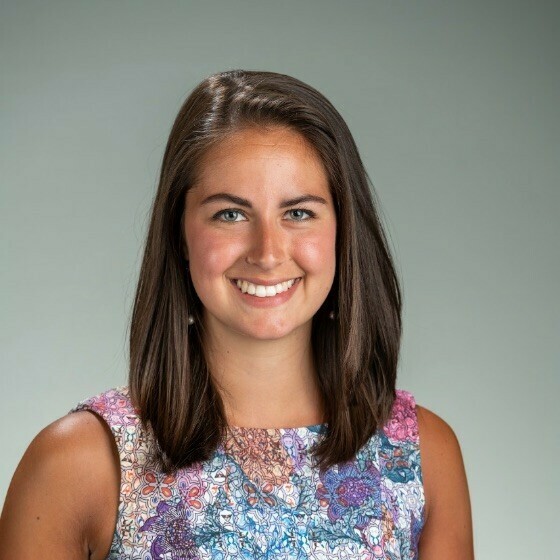
Kate Hardiman Rhodes, a 2016-2017 Tocqueville Fellow, graduated from Notre Dame in 2017 with a B.A. summa cum laude in the Program of Liberal Studies and a minor in Philosophy, Politics, and Economics. She then received her M.Ed. through Notre Dame’s Alliance for Catholic Education (ACE) program in 2019.
In 2021, Rhodes published Unshackled: Freeing America's K-12 Education System alongside long-time champion for educational choice Clint Bolick. She graduated from Georgetown Law School in 2022. With a long-term goal to litigate for religious liberty and school choice, Rhodes’ career trajectory can be traced back to her first class with CCCG director Vincent Phillip Muñoz in 2015.
Growing up in the public school system, Notre Dame was Rhodes’ first experience of Catholic education. While taking classes about constitutional law and education law and policy, Rhodes was made aware of the intricate link between religious liberty and education.
“I realized that so many of the constitutional issues around religious liberty … originated in schools,” Rhodes said.
Her passion for religious liberty and education grew as she became more interested in the “broader intellectual discussion of constitutional principles and the government that our framers set up” through her involvement with the Tocqueville Fellows program which Rhodes says was a “pivotal part of [her] broader experience at Notre Dame.”
As a Tocqueville Fellow, Rhodes participated in many events revolving around constitutional law and policy debates. Recalling several speakers that the CCCG hosted during her senior year, she credits the exposure she received to many “really brilliant, really kind-hearted people” for her decision to litigate for parental rights and religious liberty.
Rhodes’ Catholic faith serves as a foundation for her passion in protecting the rights of parents and students within our nation’s educational system.
“My career ambitions are always tethered to my faith as kind of a guiding principle. If I hadn’t gone to Notre Dame or worked with professors like Professor Muñoz, I wouldn’t have seen that as clearly as I do now,” she says.
As she learned more about Notre Dame faculty’s work on school choice, Rhodes says she “[fell in] love with the policy promise of school choice” and knew she wanted to spend her life working in education policy. With this in mind, she decided to write her senior thesis on the constitutionality and legality of school choice. In the spring of her senior year, Notre Dame Law School brought Justice Clint Bolick for a speaking event. He was “one of my school choice heroes,” Rhodes recalled.
A self-proclaimed “very bold, perhaps foolish, undergraduate,” Rhodes approached Bolick after the event and handed him her 60-page thesis. She received an email from Bolick the following morning, and they met for coffee to discuss her ideas and arguments.
Their relationship continued after she graduated and moved to Chicago to teach high school English and religion. While she was teaching, Rhodes remained active in the policy debates surrounding education. She published over 100 articles about school choice and education policy with the Washington Examiner.
One day, Bolick called Rhodes, explained his idea for a book reimagining the American public school education system, and asked her to coauthor it with him.
“Several of the arguments I had written and considered for my senior thesis evolved into some parts of our book,” Rhodes said. From there, Unshackled was born.
Midway through final drafts, the pandemic began, and schools around the country began to adapt in different ways to online and socially-distanced learning. Rhodes said that she and Bolick had to rethink and refine many of their ideas after COVID.
“I really felt like I had my own insights to bring as someone who had recently worked in a school and implemented a blended learning curriculum using technology,” Rhodes said.
After moving to Washington D.C., Rhodes pursued a law degree as a night student at Georgetown Law Center while working for a constitutional law firm during the day. Looking back, Rhodes emphasizes how important it is to know why you want to go to law school.
“It’s a big investment. It’s a big chunk of time of your life, and if you just kind of flow into it because [...] you don’t know what to do next, I think you’re setting yourself up to not be happy,” she said. “If I hadn’t found my education interests, I wouldn’t necessarily have been going for the right reasons.”
“It might not always be that you work at a law firm or have a super prestigious legal job,” Rhodes says of balancing marriage and family life with her goals in her law career.
Looking to the future, Rhodes feels it is most important to stay focused on why she went to law school: furthering religious liberty and parental choice in education.
“I think I ideally want to do something that combines education, religious liberty, and the law—whether that’s teaching or helping to defend school choice policy in the courts. All of that to me is very much driven by my religious convictions.”
She encouraged current students to remain open to respectful discussion on campus: “Be willing to dialogue with anyone on campus, especially those who disagree with your views. I think that’s really lacking on all college campuses,” Rhodes said. “It’s really important to almost seek out and engage with people who you know disagree with you and really build bridges and get along as friends even if you continue to disagree with them.”
Article contributed by CCCG Writing Fellow Merlot Fogarty.